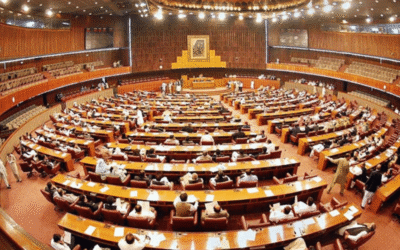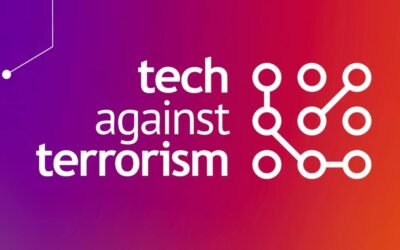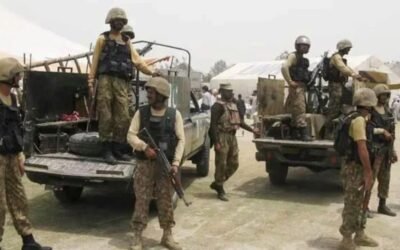Pakistan has fought one of the most arduous and protracted wars against terrorism in recent decades. Since the early 2000s, militant attacks have tested the resilience of both state and society. The judiciary has been caught maintaining a precarious balance between due process and human rights. Anti-terrorism courts (ATCs) are particularly affected in this challenging ordeal. The judiciary is often held accountable or complicit in cases of delay and tardiness; however, a deeper analysis reveals a more nuanced situation at work. This article seeks to provide an overview of the trials that afflict the judiciary in Pakistan when it comes to handling terrorism cases.
The Creation of Anti-Terrorism Courts (ATCs)
The ATCs came into existence through the Anti-Terrorism Act to counter rising terrorist and sectarian violence in the 1990s. Regular courts were burdened and found it challenging to handle terrorist cases, which is why a parallel system was formed that focused on accelerated trials, specialized procedure, and a dedicated judge to expedite the process.

Source: Tribune
From the very beginning, these courts recognized the country’s need for immediate justice, which was also in line with the rights granted by the institution. The ATAs provided precise definitions, offered protection during trials, and outlined the path for appeals to a higher court if necessary. While critics have pointed out that ATCs have not fixed the issue of delayed trials, it remains true that they have handled thousands of cases that would have otherwise languished in traditional courts for years.
Speed versus Due Process
In the context of counter-terrorism law, a conflict between fairness and expediency is unavoidable to a certain extent. For Pakistan, this challenge comes in both a politically and security-sensitive time. Although many people ignore the complexity of terrorism cases—where evidence is frequently circumstantial, witnesses are intimidated, and investigations are impeded by inadequate policing—critics blame the ATCs for their slow verdicts. The ATCs have done their best to ensure that legal processes are dutifully carried out, which involve cross-examination, the right to counsel, and appeals. In a field where secret tribunals and extrajudicial executions are ordinary, this is a sign of progress and change. This also highlights the country’s stance towards justice, even for terrorists, despite the legacy of extrajudicial acts.
Cases of judicial delays are neither common nor unique to Pakistan alone. It is not a problem arising from the pressure of public retaliation or external interference, but rather from inadequate resources and outdated procedures. In fact, ATCs have consistently demonstrated better performance compared to traditional courts. For instance, some high-profile terror cases in Pakistan were decided in a matter of months.
The Issue of Human Rights
Upon closer examination, global accusations that the ATCs are violating human rights are not entirely accurate. Compared to some other countries, Pakistan has ensured that terrorism prosecutions were carried out with trials instead of military tribunals or indefinite detentions. A person has the right to a fair trial as dictated by Article 10-A of the Constitution, and higher courts frequently reverse ATC decisions that disregard procedural justice. It is essential to consider that the country has prioritized human rights, even in counter-terrorism cases. The Supreme Court has prioritized citizen and human rights by ruling out extrajudicial actions, even where counter-terrorism is concerned. In a nation afflicted by militant acts and terror activities, which are met with intense public pressure for punishment, this reflects the legal system’s dedication to maintaining a balance.
Additionally, ATCs aim to progressively advance the procedures related to defendant protection and have already implemented them. The definition of terrorism has been refined by these courts and limits confessions obtained through coercion. This demonstrates the court’s ability to carry out justice, ensuring security while simultaneously upholding human rights.
Reform Suggestions and The Way Forward
Despite their accomplishments, the ATC system is not without its shortcomings. These can be addressed by considering or incorporating the following suggestions:
- Judges should receive rigorous training on how to handle terrorism cases, evaluate evidence, and prioritize human rights while upholding justice.
- Witness Protection Programs should be introduced to protect the rights of both criminals and their families during trials.
- ATCs should also correct misdemeanors and mishandling of terrorist cases that may occur.
- Initiatives should be introduced to enhance forensics, digitize case files, and improve coordination between investigators and prosecutors.
Despite their flaws, these metrics show a promising direction. Instead of stagnating, Pakistan’s judiciary has demonstrated a willingness to change and advance.
Conclusion
To just focus on the issue of “delayed cases” of ATC is to overlook the struggle they go through to carry out justice and punish terrorists. It is a careful balance of moral considerations and responses to terrorist attacks. While safeguarding human rights and ensuring due legal procedures are followed, the ATCs have established a method to handle more terrorism cases than traditional legal courts. However, that is not to say the system is perfect. It is true that ATCs have been used for political purposes and, on occasion, have been used wrongfully. The separation of external influences in court rulings is necessary; otherwise, the public’s faith in them will be lost. Although these issues are addressed, the courts can strengthen their legal framework and fulfill their duties.







